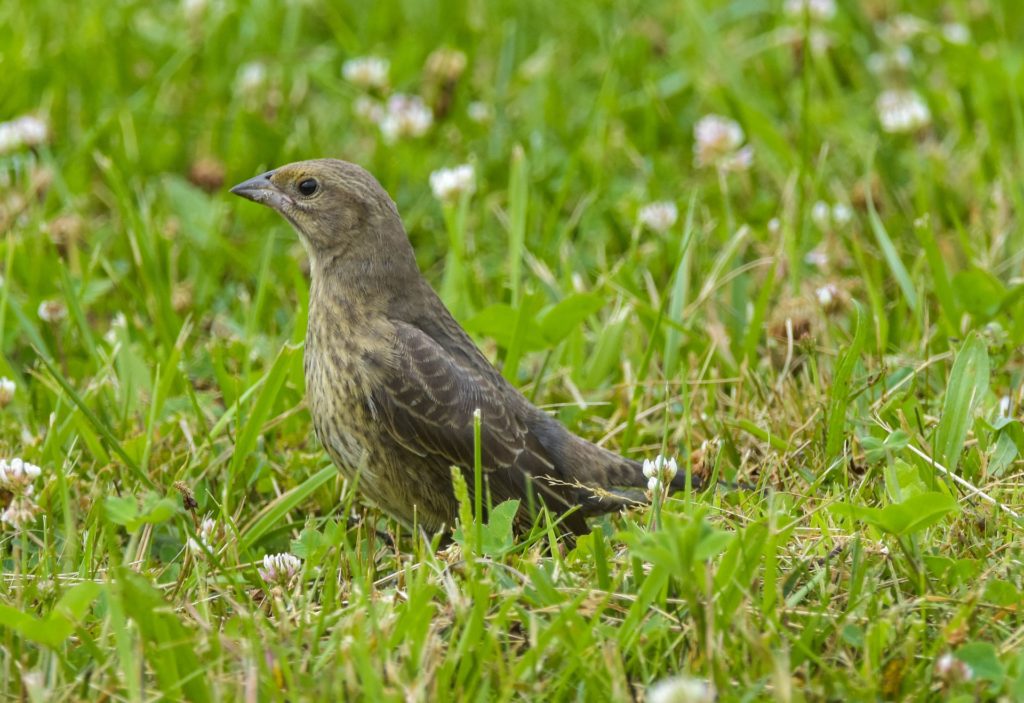
Ah, the Brown-headed Cowbird. The arch-enemy of many backyard bird enthusiasts. Yes, this bird even made our Bird Moral Alignment Chart as the Chaotic Evil representative (but they’re not really “evil” – read on).
But we have a challenge for you. Next time you encounter one of these infamous brood parasites, we encourage you to try to see them in a new light.
Don’t worry, we’ll help you out!
Brown-headed Cowbirds provide an opportunity to see some unusual breeding tactics, and they highlight yet another way birds are fascinating. Considering this, perhaps we can actually appreciate these seemingly sinister songbirds because of their creative survival strategy.
In case you haven’t heard their reputation, we’ll catch you up. These guys are brood parasites, meaning they lay their eggs in the nests of other birds in lieu of crafting their own nests. If you get a chance to witness this in your backyard, get ready for some drama, but also for many avian education moments straight from the real world.
Most birds learn about how to be an adult through their parents, so how do baby Cowbirds learn how to be an adult?
Brown-headed Cowbird females and their chicks develop a fascinating form of communication that helps the chick learn it is indeed a Cowbird. It’s a chatter that serves as a codeword, like password recognition. The mother Cowbird will sound her password, and the Cowbird chick learns to associate this with traits that are specific to Brown-headed Cowbirds.
It was found in a study (published in the Journal of Experimental Biology) that adult Cowbirds more frequently react to sounds of the chatter than of control sounds.
And this is something you can certainly witness. Listen for the mother Cowbird’s calls and watch how her chick reacts to her presence. The young cowbird is learning through these interactions despite not having the constant company of its mother. They’re pretty smart, huh?
With an overwhelmed set of host parents and a protective mother looming nearby, it can be quite tense at a nest that houses a Brown-headed Cowbird egg or nestling.
If you find a nest near you, you’ll likely see the Brown-headed Cowbird mother visiting the host nest on high alert. She may be aggressive towards the host species in an effort to protect her egg or nestling. You might even catch her peering through the trees eyeing you!
At eggs stage, you may see some host species creatively responding to the Cowbird parasite eggs. Yellow Warblers for instance can recognize the Cowbird eggs, but they are too small to push them out, so they often build a new nest on top of the old nest that has the Cowbird egg.
Once the eggs hatch, you’ll see different growth rates of the host nestlings and the Brown-headed Cowbird nestling. The Cowbird often grows and fledges faster, and it will frequently pass up the size of the host parents. You’ll see some competition between siblings as the young Cowbird begs for food from the host parents.
It’s tempting to assign aggression towards backyard bird fledglings as bullying. But it’s good to remember that birds truly have no vicious motive or intent. Survival is the goal.
Even some beloved birds have some strange, aggressive, and even violent behaviors. Red-bellied Woodpeckers sometimes take over nests of smaller birds, even rare birds like the Red-cockaded Woodpecker. Peregrine Falcons’ diets include many songbirds we love and appreciate.
These behaviors don’t make Red-bellied Woodpeckers or Peregrine Falcons evil. They are simply doing what is instinctual.
Even brood parasitism emerged from aggression. It’s suspected that it evolves from the parasitic species once suffering from lots of nest predation, encouraging them to lay their spare eggs in the nests of other birds.
Most importantly, it’s important to remember that in the instance of brood parasitism by Brown-headed Cowbirds, we should let nature take its course. It’s understandably troubling to watch sometimes, just like we don’t like to see a snake making advances towards our backyard bird feeders. But we must respect nature’s course in this situation. Insects and fish are prey to birds, and sometimes, birds are prey to other birds.
We certainly hope the young residents of a nest inhabited by a Brown-headed Cowbird fledgling survive just fine, but despite what occurs, may we take it as an opportunity to humbly respect nature’s ebbs and flows. It’s a joy to observe it, even in the bittersweet times.
References